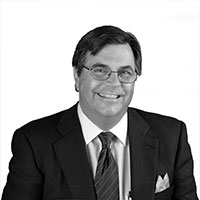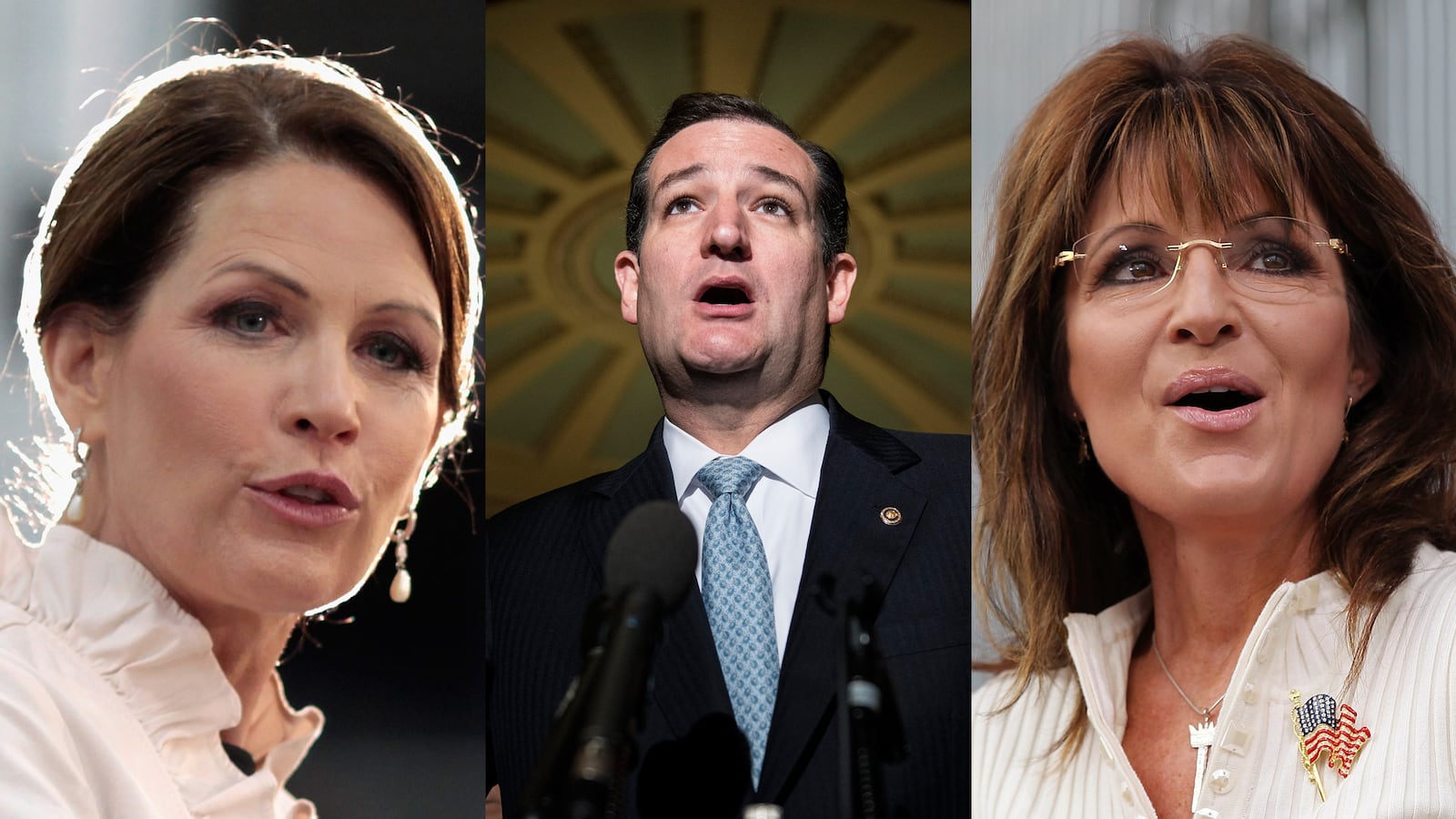Want to know why the Tea Party so eager to grievously wound the Republican Party? The answer is as simple as it is counterintuitive: its leaders view themselves as modern prophets of the apocalypse.

In the aftermath of the great government shutdown of 2013, the Tea Party continues to cause heartburn for establishment Republicans. Consider the results of last week’s elections, which offer clues to the internecine GOP battles that lie ahead. Although it’s much too early to draw hard conclusions, Chris Christie proved that a moderate, common-sense Republican could win in deep blue New Jersey, while in purple Virginia the wild-eyed social reactionary Ken Cuccinelli failed to gain traction outside his uber-conservative Christian-right base.
Yet the Tea Party is willing to defy overwhelming negative public opinion, wreck the government, risk plunging the world economy into chaos and invite political defeat. The driving force behind this destructive strategy is that Tea Party zealots answer to a “higher calling.”
They believe America teeters on the brink of destruction, and hold as an article of faith that liberals, gays, Democrats, atheists and the United Nations are to blame. This “end-times” world-view is a foundational precept of the evangelical movement, from which many of the so-called Tea Party favorites spring. Scholars call it apocalypticism.
Of course, the Tea Party is not just composed of members of the Christian right. Many are genuine libertarians. Some nurse an unreconstructed Confederate grudge, while others harbor a thinly disguised racism. However, the real energy, the animating force for the movement comes from evangelicals, of whom Ted Cruz, Michelle Bachmann and Sarah Palin are the most strident. These are the modern-day ”apocalyptic prophets.”
Although the issues are secular, the prophets’ anti-Obamacare rhetoric rings with religious, end-times cadences. So to understand why they invoke chaos, we need to know where their ideas about an “apocalypse” came from.
Most theologians, including the revered Albert Schweitzer, believe John the Baptist and Jesus of Nazareth were Jewish apocalypticists. Simply put, these first-century prophets believed they were living in the “end times” before God would send his representative, the “Son of Man” (taken from a rather obscure passage in the Book of Daniel), to overthrow the forces of evil and establish God’s justice on earth. Apocalypse literally translates as “the revealing” of God’s will. For these early prophets the Kingdom of God was not to be a church, but a military and political kingdom on earth.
Lest this sound far-fetched to modern ears, listen to our modern Tea Party prophets in their own words:
“You know we can’t keep going down this road much longer. We’re nearing the edge of the cliff . . . We have only a couple of years to turn this country around or we go off the cliff to oblivion!” - Ted Cruz at the Values Voters Summit, Oct. 11
“. . . I’m a believer in Jesus Christ, as I look at the End Times scripture, this says to me that the leaf is on the fig tree and we are to understand the signs of the times, which is your ministry, we are to understand where we are in God’s End Times history. Rather than seeing this as a negative . . . we need to rejoice, Maranatha Come Lord Jesus, His day is at hand. And so what we see up is down and right is called wrong, when this is happening, we were told this, that these days would be as the days of Noah. We are seeing that in our time.” - Michelle Bachmann, Oct. 5, 2013
“And this administration will been [sic] complicit in helping people who wants [sic] to destroy our country.” – Louie Gohmert on the floor of the U.S. House
“The biggest war being waged right now is against our religious liberties and traditional values.” - Rep. Tim Huelskamp, Values Voters Summit
“The fight for religious freedom starts here at home because we are one nation under God.” - House Majority Leader Eric Cantor, Values Voters Summit
For these apocalyptic prophets, the issues aren’t even political anymore; they’re existential, with Obamacare serving as the avatar for all evil. In this construct, any compromise whatsoever leads to damnation, and therefore the righteous ends justify any means.
Much of the prophets’ message is couched in populist language. It sounds familiar to us because we’ve heard it all before. Historically whenever our country has experienced economic stress an angry, reactionary vein of populism surfaces. Sometimes called “Jacksonian,” this common thread actually reaches back to the American Revolution, then to Shay’s Rebellion, through Jackson’s “Augean Stables” to William Jennings Bryan’s rants against science in the Scopes “Monkey Trial.” It includes “Know-Nothings,” Anti-Masons and Huey Long’s “Every Man a King.” George Wallace stood in the schoolhouse door and Ross Perot sabotaged George Bush the Elder’s re-election. Except for Andrew Jackson, each burst of populist fervor ended badly.
Our modern prophets are fundamentally different. Their dogma springs from Pat Robertson and Jerry Falwell, through James Dobson’s Family Research Council, to the eerily omnipresent Fellowship and its C Street house.
Ted Cruz’s father, Raphael was seen in recently uncovered videos calling for America to be ruled by “kings” who will take money from anyone who is not an evangelical Christian and deliver it into the hands of fundamentalist preachers and their acolytes. This is a movement is called “Christian Dominionism,” and it has many adherents the evangelical right. It is also obviously and dangerously anti-democratic. These new apocalyptic prophets, and the demagogues who profit (pun intended) from them, see themselves locked in mortal combat against the Anti-Christ in a fight for America’s soul – and wealth.
Now if you are battling the forces of evil for the very survival of the nation, there can be no retreat, no compromise, and no deals. Like the Jewish zealots at Masada, it’s better to commit glorious suicide than make peace with the devil. There can be no truce with the Tea Party because its apocalyptic zealots can never take “yes” for an answer.
Since the apocalyptists cannot compromise, they must be beaten. President Obama and congressional Democrats seem to have finally grasped this fact, and are learning how to deal with them. By refusing to knuckle under to extortion in the government shutdown drama, Obama exposed their reckless radicalism and won resoundingly.
But Democrats can’t solve this problem alone. To bring any semblance of order back to the American political system and restore a functioning two-party system, the GOP has to find its own equilibrium. Thankfully, this process has already begun.
Establishment Republicans, corporate CEOs and Wall Street moguls stand appalled at the Tea Party monster they helped to create. Formerly cowed into silence, they are beginning to see the handwriting on the wall and speak out against the self-destructive zealots.
In conservative Virginia, Ken Cuccinelli was largely abandoned by the GOP establishment. Many Republican leaders even went so far as to endorse the Democrat, Terry McAuliffe. Unable to raise significant money from the Republican establishment, Cuccinelli was outspent more than ten-to-one. While Virginians rejected a conservative who believes government’s role is to regulate morality, New Jersey voters chose a conservative Republican who believes government has a constructive, practical role to play.
The contrast is striking – and instructive. Until Republicans slug it out among themselves and decide which kind of party they want to be, we will continue to lurch from crisis to crisis.
This family fight will not be easy or bloodless. The Tea Party represents roughly one-half of the Republican base. They love Cruz, Palin and the chorus of other voices crying in the wilderness. They are unified in their hatred of Obama, and they are organized down to the precinct level. More importantly, they despise the moderate voices in their own party.
Gerrymandered congressional districts guarantee many safe Tea Party seats. Powerful think tanks and advocacy groups like The Heritage Foundation, the Chamber of Commerce, American Enterprise Institute and others, which in years past underpinned the Republican establishment, are now heavily invested in the right-wing agenda and will not be easily co-opted. Deep-pocketed militants like the Koch brothers will keep the cash flowing, and right-wing talk radio-heads will whip up the aggrieved faithful.
It’s almost impossible to predict how this family fight will end, but there are at least two possible outcomes:
First, the pragmatists win. The Grand Old Party could be led out of the wilderness by a charismatic figure a la Chris Christie, who is viewed as a straight-talking, practical problem-solver. Any such leader will have to arise outside Washington. The pragmatists’ backers would include big business, Wall Street, the military-industrial complex, GOP lobbyists and a plethora of wealthy patrons who can’t afford any more Tea Party shenanigans.
They have a strong case. Moderates have won some dramatic conservative victories over the years, delivering massive tax cuts, reforming welfare, de-regulating Wall Street, diluting Roe v. Wade, reviving federalism with block grants and reshaping today’s conservative Supreme Court.
Second, the hard-liners revolt. The party splinters, and out of the wreckage a new center-right “Whig Party” emerges. This is not so far-fetched as it may seem. A recent bi-partisan polling by NBC and Esquire Magazine reveals a wide plurality: 51% of Americans view themselves as centrists, not deeply invested in either party.
Not surprisingly, these moderates have both liberal and conservative views. 64% support gay marriage, 63% support abortion in the first trimester, 52% support legalizing marijuana, and they support a strong social safety net by wide margins. But 81% support offshore drilling, 90% support the death penalty and 57% are against affirmative action. So a new moderate coalition might well attract significant support from the moderate middle, establishment Republicans, Independents and centrist Democrats too.
Unfortunately for the apocalyptic prophets, only 29% of the moderate middle thinks churches or religious organization should have any role at all in politics. So like the prophets of old, they seem fated to join that long sad procession of failed zealots and martyrs who were overwhelmed by hard reality and their own rigid dogma.






